
A customer success course represents a specialized training initiative aimed at equipping professionals with the essential skills required to ensure clients achieve their desired outcomes while utilizing a product or service. This focus on client satisfaction and retention is critical in today’s competitive landscape.
The article elaborates on the various components of such courses, including:
These components underscore their significance in driving business growth and reducing churn rates. By investing in these training programs, organizations can foster stronger client relationships and enhance overall satisfaction, ultimately leading to increased loyalty and profitability.
In an increasingly competitive business landscape, the significance of customer success cannot be overstated. Organizations are striving to enhance customer satisfaction and retention, and specialized training programs have emerged as essential tools for professionals aiming to excel in this field. Customer success courses equip individuals with the skills necessary to foster strong client relationships and ensure that customers achieve their desired outcomes.
These programs, ranging from foundational training to advanced certifications, are designed to meet the evolving needs of the market, reflecting the growing recognition of customer success as a strategic priority. As companies invest in these educational opportunities, they not only enhance their workforce's capabilities but also drive sustainable growth and profitability in a rapidly changing environment.
Client achievement programs represent specialized training initiatives designed to equip professionals with the essential skills and knowledge necessary for ensuring clients achieve their desired outcomes while utilizing a product or service. These programs encompass various facets of client management, including relationship development, onboarding processes, and proactive engagement strategies. By emphasizing client satisfaction and retention, these programs empower individuals to foster long-term relationships with patrons, which is vital for driving business growth and reducing churn rates.
In 2025, the landscape of customer success courses has evolved significantly, marked by a notable increase in enrollment as organizations recognize the critical importance of investing in customer success training. Current data reveals that a substantial portion of employees—30%—would consider seeking alternative employment if required to return to the office full-time. This underscores the necessity for adaptable and effective development solutions that can respond to changing work environments.
Practical examples illustrate the effectiveness of client achievement training programs. For instance, businesses that have integrated data-driven technologies and AI into their client achievement strategies report enhanced interactions and improved service delivery. As these technologies proliferate, client achievement teams are increasingly focused on data analytics and AI-driven conversations, resulting in deeper insights and engagement with clients.
Convin's AI-driven solution exemplifies how technology can be leveraged to enhance contact center performance and client interactions, further enriching the discourse on the evolving landscape of client support education.
Expert perspectives emphasize the crucial role of education in the customer success course. Rajvir Singh, Founder of Code and Compile, states, "Using LearnWorlds’ robust features, I have achieved a monthly revenue of $2,000," highlighting the direct impact that effective education can have on revenue generation. Industry leaders assert that customer success courses are not merely advantageous but essential for organizations striving to excel in competitive markets.
The core components of impactful client achievement programs include the customer success course, which provides comprehensive training on client relationship management, effective communication skills, and strategies for proactive client engagement.
The influence of customer success course education on business outcomes is profound. Organizations that prioritize their customer success training often witness improved client satisfaction scores, higher retention rates, and ultimately, increased revenue. Moreover, data from Custify indicates that businesses are focusing on reducing churn and boosting revenue through enhanced client engagement, which aligns seamlessly with the emphasis on customer success courses.
As the client satisfaction landscape continues to evolve, the significance of the customer success course will only grow, rendering it a critical investment for businesses aiming to refine their client engagement strategies.
Client achievement is paramount for enterprises, directly influencing client satisfaction, loyalty, and retention. In an increasingly competitive market, organizations that prioritize client satisfaction are poised to experience significant revenue growth through repeat transactions and recommendations. A recent study revealed that 78% of clients have abandoned a purchase due to a poor experience, underscoring the urgent need for effective engagement strategies that can mitigate such losses.
By concentrating on maximizing the value clients derive from their products or services through a customer success course, companies can significantly reduce churn rates and foster a loyal customer base. For instance, businesses implementing robust onboarding processes witness a 55% increase in early product usage, according to a Wyzowl study, which is crucial for long-term retention. This proactive approach not only enhances client experiences but also contributes to sustainable business growth, positioning the customer success course as a strategic focus for modern enterprises.
Current trends indicate that despite advancements in technology, delivering exceptional client experiences will remain challenging in 2025 due to rising expectations and privacy concerns. Companies like Zara, H&M, and Adidas are committing to sustainable practices, recognizing that consumer satisfaction is intertwined with broader societal values and client expectations. Moreover, findings from Forrester reveal that firms prioritizing client satisfaction retain over twice the number of clients compared to those that do not, highlighting the critical role of client satisfaction in retention strategies.
In summary, the importance of client satisfaction in business cannot be overstated. It is a crucial driver of revenue growth and retention. As businesses navigate the complexities of the contemporary marketplace, investing in a customer success course will be essential for achieving long-term success.
Client achievement programs, such as the customer success course, are crucial for professionals aiming to excel in this evolving sector. These programs can be categorized into three primary types: foundational programs, advanced training, and specialized certifications.
The demand for customer success courses is evident, as enrollment figures reflect a growing interest in both basic and advanced offerings. For instance, a recent report revealed that firms investing in client education experience a 16% reduction in support inquiries and a 7% decrease in support costs, underscoring the tangible benefits of such training. Dr. Laetitia Samuel-Owusu noted, "organizations that invest in client education experience a 16% decrease in support inquiries and a 7% reduction in support expenses," further affirming the effectiveness of client support programs.
Moreover, the 2022 Client Education Council Report highlighted the importance of client education within organizations, particularly through customer success courses focused on product onboarding and churn reduction. Despite challenges in resource allocation, the report emphasized that effective client development training leads to improved business outcomes. It also addressed the objectives and challenges faced by client education initiatives, underscoring the necessity for structured instruction.
In evaluating the various types of programs within the customer success course, it is clear that each serves a distinct purpose, catering to professionals at different stages of their careers. Foundational courses create the base, advanced education enhances strategic insight, and specialized certifications confirm proficiency, together forming a comprehensive pathway for career advancement in client management. As the landscape continues to evolve, especially with a focus on data-driven technologies and AI-driven interactions, organizations prioritizing client education are likely to witness enhanced experiences, with 86% of buyers willing to pay more for exceptional service.
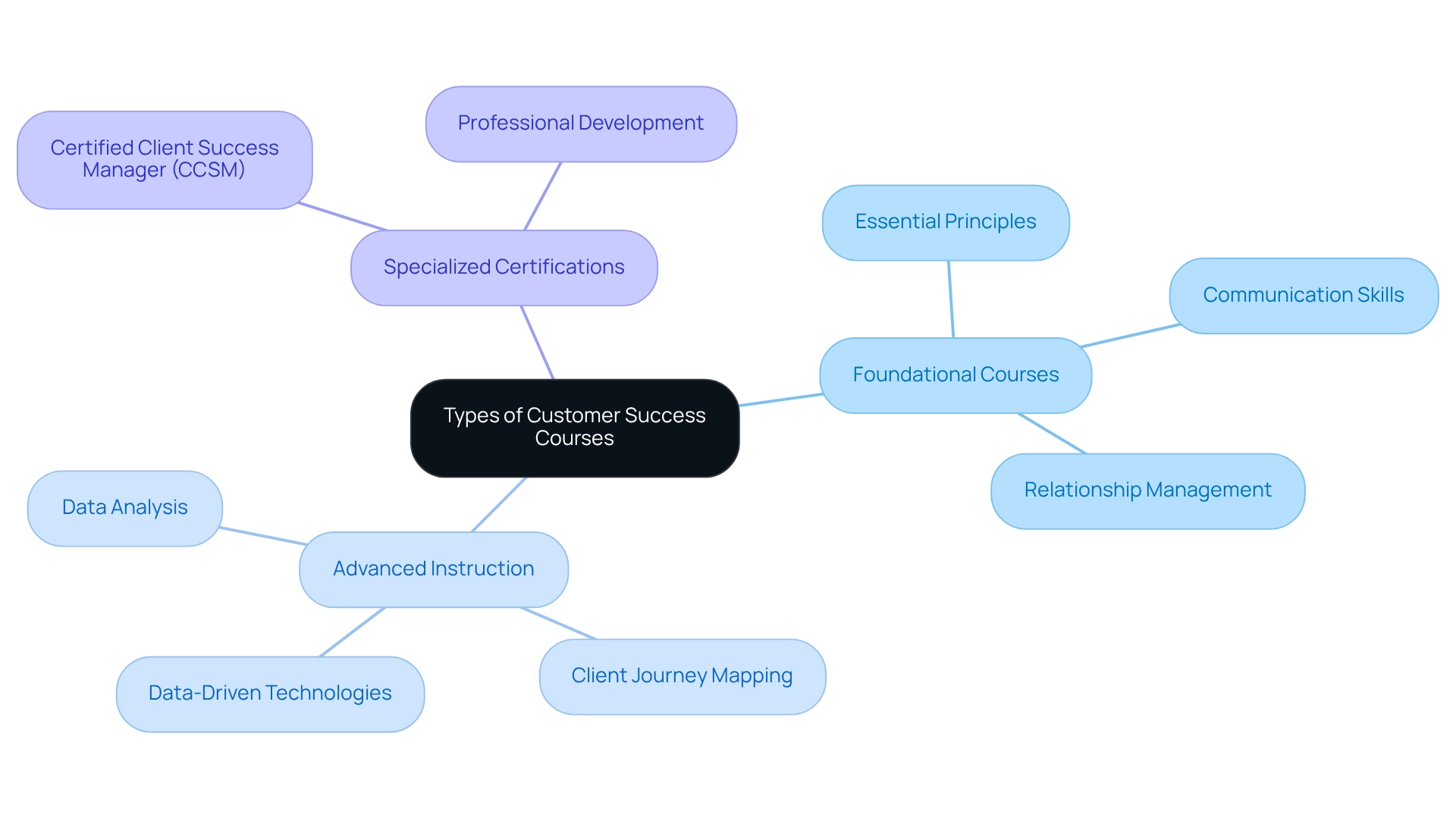
Participant development at Magical Selling equips professionals with essential abilities critical for cultivating robust client relationships and ensuring patrons achieve their intended results. Key competencies such as effective communication, problem-solving, and strategic thinking are developed, all vital for strategic account management in defense sectors. These skills not only enhance interactions with clients but also empower professionals to navigate challenges and deliver tailored solutions that improve account retention and stimulate revenue growth.
Training programs, as outlined in the user manuals, cover crucial topics including client onboarding, engagement strategies, and metrics for evaluating success. Notably, preparation for the customer success course receives only 23.8% of effort and 14.8% of the budget, underscoring the urgent need for improved resource allocation in client achievement training. Furthermore, a significant 72% of Client Relationship Managers (CSMs) express a desire to automate administrative tasks, highlighting the necessity for development that enhances efficiency and effectiveness in their roles.
Practical examples underscore the impact of effective communication in client relations. Organizations that have refined their service experience strategies, including education and development, have reported remarkable outcomes:
This data illustrates the tangible benefits of investing in a customer success course, particularly within the realm of strategic account management.
As emphasized by SurveySparrow, implementing client achievement extends beyond merely employing tools; it requires leadership to formalize the organization’s strategic framework and delivery model, highlighting the importance of these competencies in achieving organizational objectives.
Moreover, the effectiveness of such education is evident in the skills acquired. Statistics reveal that a well-structured client achievement program can significantly enhance communication and problem-solving skills, which are essential for addressing client needs and fostering satisfaction. Analysis of knowledge base utilization shows that 66% of support teams utilize knowledge bases, compared to 82% of clients, emphasizing the critical role of knowledge management in client achievement-focused roles.
In summary, the customer success course offered by Magical Selling not only develops essential skills but also plays a vital role in enhancing communication and problem-solving abilities. This ultimately supports the overall prosperity of organizations in a competitive landscape and facilitates strategic account management for sustained revenue growth. This training is an integral part of a comprehensive strategy designed to retain accounts and drive revenue growth, ensuring that enterprise executives can allocate resources effectively.
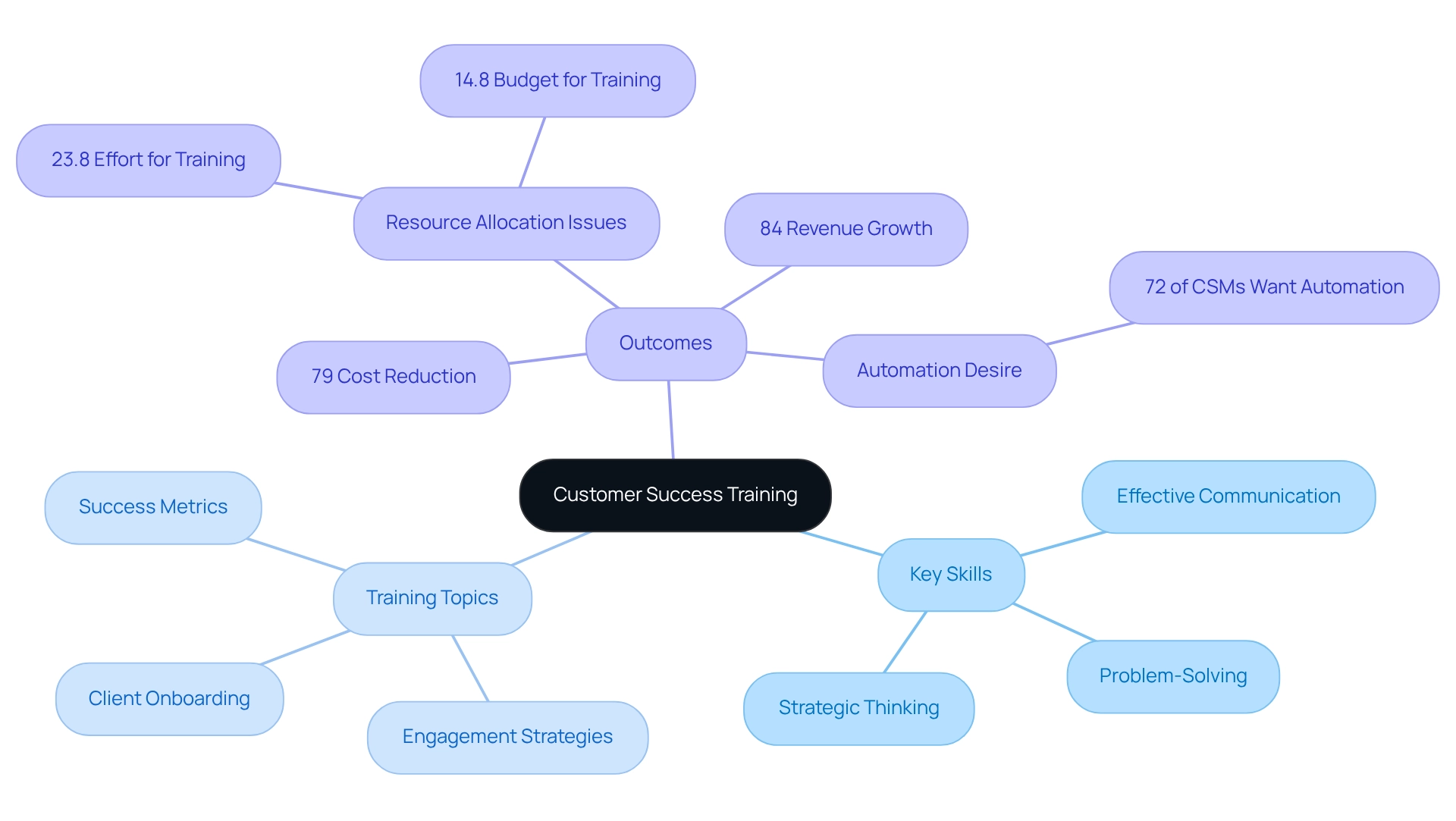
Obtaining a certification from a customer success course offers numerous benefits that extend beyond mere qualifications. In 2025, the landscape of client achievement is becoming increasingly competitive, with organizations prioritizing certified experts who have completed a customer success course and demonstrate a commitment to excellence in client interaction. Certifications not only enhance credibility but also significantly improve job prospects and earning potential.
Recent statistics reveal that certified client achievement professionals are more likely to secure higher-paying roles, with many reporting salary increases following certification.
The value of these certifications is underscored by insights from HR professionals, who emphasize that candidates with recognized credentials, particularly those who have completed a customer success course, stand out in the hiring process. This distinction is particularly crucial as 44.2% of companies have recently laid off Customer Success Managers (CSMs), making it imperative for job seekers to differentiate themselves in a contracting market. In this context, completing a customer success course can provide a strategic advantage, enabling professionals to showcase their skills and commitment to the field.
Moreover, completing a customer success course opens pathways to unique networking opportunities and resources, fostering relationships that can advance careers. For instance, initiatives such as RecastSuccess's Bootcamp have effectively promoted diversity in the tech sector, equipping mid-career professionals from marginalized communities with the skills necessary for client-oriented roles. Participants in a customer success course frequently report enhanced career advancement opportunities, illustrating the tangible benefits of certification.
As the client satisfaction sector evolves towards data-driven technologies and AI-enhanced interactions, professionals who have completed a customer success course are better positioned to leverage these advancements. This not only enhances their effectiveness but also aligns with the strategic goals of organizations aiming to improve client loyalty and reduce client acquisition costs (CAC). Caroll Simmons, Director of Customer Success, emphasizes that "Customer Success is now more than a department under Sales, Marketing or Operations; it has become an integral part of the company culture and part of a new growth engine for companies."
In essence, acquiring a customer success course certification is not merely an investment in personal growth; it is a strategic action that can greatly influence career trajectories and earning potential in a rapidly evolving job market. Additionally, with the latest job opportunities in Customer Success, including CS Leadership and CSM roles, the demand for certified professionals who have completed a customer success course is evident, further underscoring the importance of these credentials.
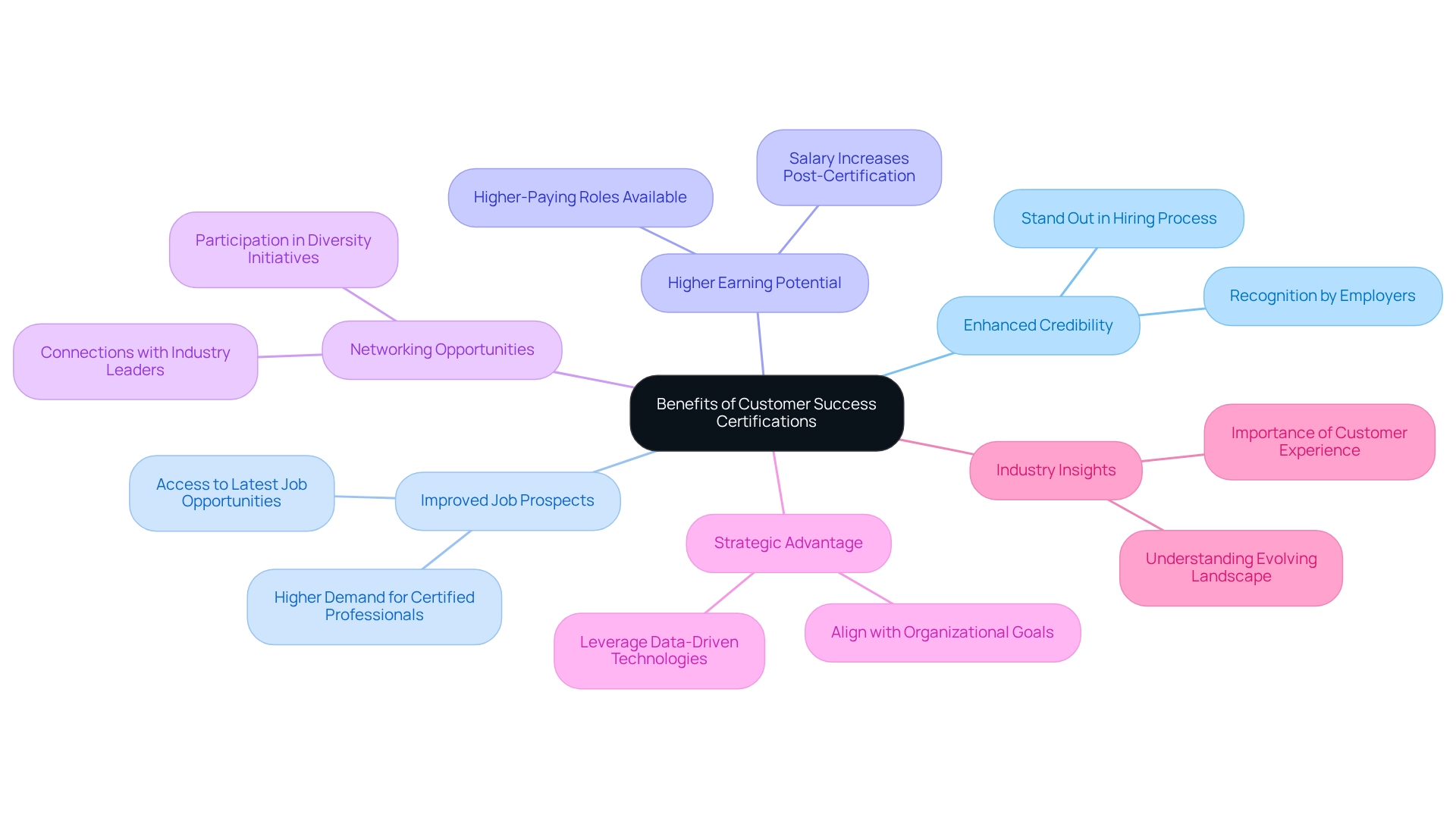
Prerequisites for client success programs, such as those offered in the Consultative Selling – Module 4 by Magical Selling, can vary significantly based on the program's level and specific focus. Fundamental classes are often designed to be accessible, requiring no prior experience, making them ideal for beginners eager to enter the field. Conversely, advanced classes and certifications typically necessitate a background in service, sales, or related areas, ensuring participants possess the essential knowledge for deeper learning.
Prospective students should carefully examine the enrollment requirements for each course, aligning them with their current skill sets and career goals. Importantly, many programs now provide flexible online formats, allowing participants to learn at their own pace, which is particularly advantageous in today’s fast-paced environment.
Statistics reveal that client education initiatives can enhance product retention by an impressive average of 22%, underscoring the importance of well-structured instruction. Furthermore, a recent report on trends in client and partner education highlighted feedback from over 150 education leaders, emphasizing the growing demand for effective instructional solutions. Notably, 72% of Customer Success Managers (CSMs) express a desire to automate aspects of their roles, indicating the necessity for comprehensive training that addresses these operational challenges.
Expert opinions suggest that implementing client achievement transcends mere tool usage; it requires a strategic framework, a clearly defined delivery model, and a robust organizational structure. As noted by SurveySparrow, formalizing these elements is crucial for effective client achievement management. Understanding the prerequisites for a customer success course is vital for organizations aiming to cultivate efficient client management practices, particularly through consultative selling techniques that build credibility and adequately address client needs.
Enrollment requirements can also differ by course level, with introductory courses often having minimal prerequisites, while more specialized programs may require prior experience or specific qualifications. For instance, case studies indicate that companies prioritizing client experience (CX) investments are better positioned to navigate economic challenges, further highlighting the significance of thorough education in client satisfaction. The case study titled 'Experience-led Growth in Uncertain Times' demonstrates how strategic investments in CX can strengthen long-term client relationships, reinforcing the importance of consultative selling in driving revenue growth.
In summary, as the landscape of client achievement evolves, so too do the prerequisites for training programs, making it essential for prospective students to remain informed about the varying enrollment processes and requirements across different program levels. Insights from the 2024 trends report further reinforce the importance of adapting to these changes in customer success course education, particularly through the lens of consultative selling strategies. The investment for the Consultative Selling – Module 4 is $169.00, presenting a valuable opportunity for those seeking to enhance their skills in this area.
Completing a customer success course can significantly broaden career prospects, unlocking opportunities for roles such as:
These positions play a vital role in cultivating strong client relationships and ensuring clients gain maximum value from products and services. As professionals accumulate experience, they often advance into leadership roles, including:
In these roles, they can influence organizational strategies and lead customer-centric initiatives.
The demand for skilled client success professionals is on the rise, particularly within organizations with over 500 employees, which are the primary users of Success platforms. By 2025, the job market for these roles is expected to expand further, driven by the growing recognition of client retention as a key factor for sustainable growth. In times of economic uncertainty, businesses are increasingly focusing on client renewals and retention, as illustrated in the case study titled 'Renewals and Retention are Key in Trying Economic Times.'
This underscores the crucial role of Customer Success teams in improving net renewal rates, which is essential for maintaining growth during periods of economic slowdown.
Current statistics reveal that the average base salary for client support roles is approximately $56,798, with California leading in the concentration of these positions. This reflects a broader trend, as the median annual salary for all employees was $48,060 as of May 2023, highlighting the lucrative nature of careers in client success. As Nelson Boswell wisely stated, "Here is a simple but powerful rule: always give people more than what they expect to get."
This principle resonates with the industry's focus on exceeding client expectations. As the sector evolves, professionals equipped with the right training and skills will discover abundant opportunities to excel in this dynamic field.
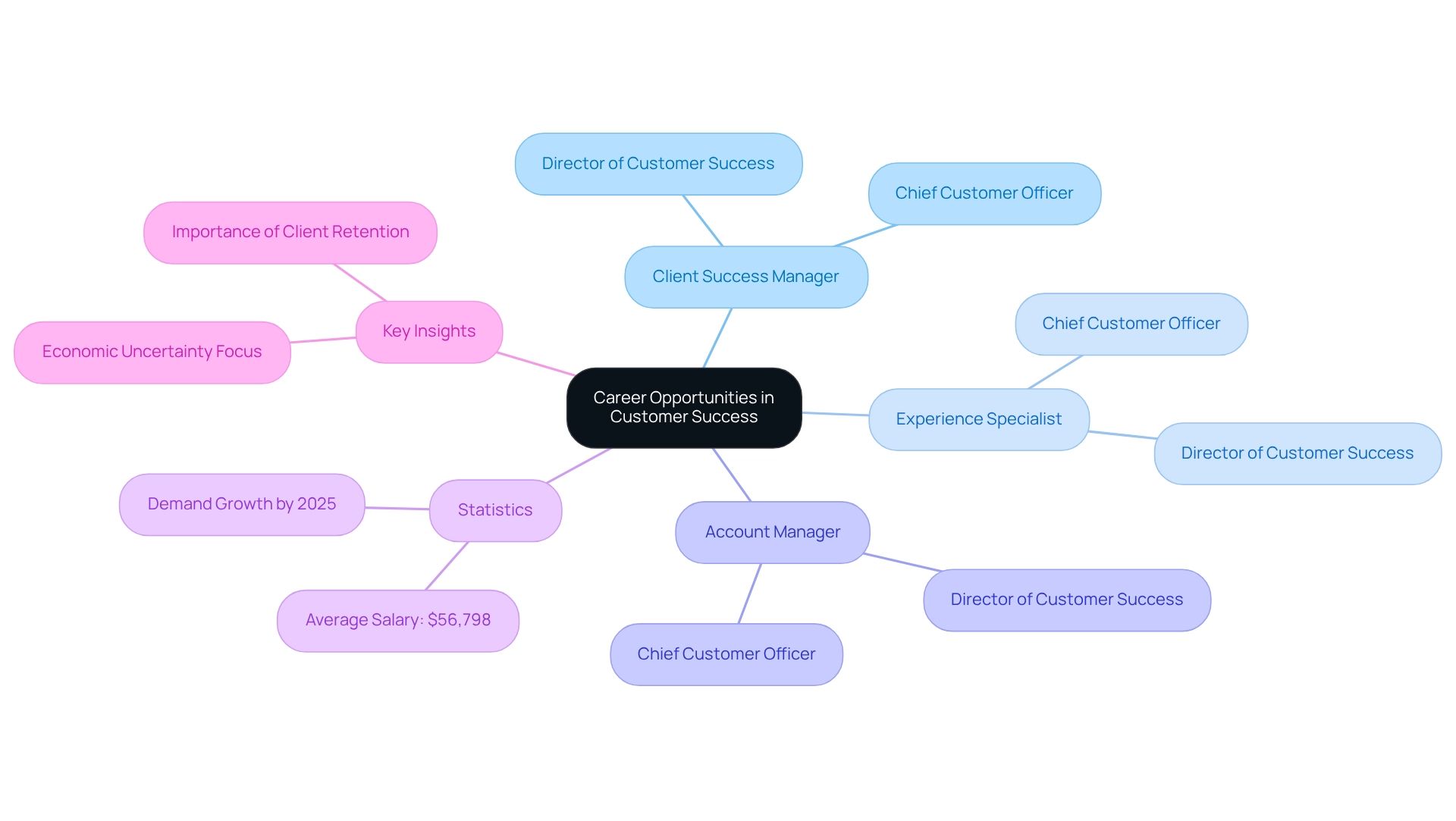
Potential students often seek clarity on various aspects of the customer success course, particularly its effectiveness, costs, and time commitments. Essential inquiries typically include:
Furthermore, many individuals are eager to understand the return on investment (ROI) associated with obtaining a certification.
Statistics reveal that enhancing client retention by just 5% can lead to a remarkable profit increase of 25-95%, underscoring the significance of a customer success course in effective client success education. As companies strive to enhance their client experience and boost revenue, it is crucial to evaluate the impact of these programs. A comprehensive assessment should consider factors such as program length, completion rates, and the tangible outcomes achieved by participants.
For instance, a recent report highlighted that 72% of Customer Success Managers (CSMs) expressed interest in automating administrative tasks, indicating a need for education that not only focuses on client interaction strategies but also equips professionals with resources to enhance efficiency. This drive for automation emphasizes the importance of selecting programs that address both strategic and operational aspects of client management, which are vital for maintaining accounts and driving revenue growth.
Moreover, Bain & Company reports that only 22% of B2B firms consistently evaluate and respond to their clients' experiences, revealing a significant opportunity for improvement through targeted education. Practical examples further illustrate the ROI of customer success courses. Organizations that invest in such programs often report increased client satisfaction and retention rates, which directly enhance their bottom line.
Magical Selling's Sales Bond Academy, for example, is designed to equip sales professionals with the essential skills to thrive in customer success roles, addressing the training needs identified in this discussion. By tackling these frequently asked questions and providing expert insights, prospective students can make informed decisions, ensuring their educational pursuits align with their professional objectives and the evolving demands of the market.
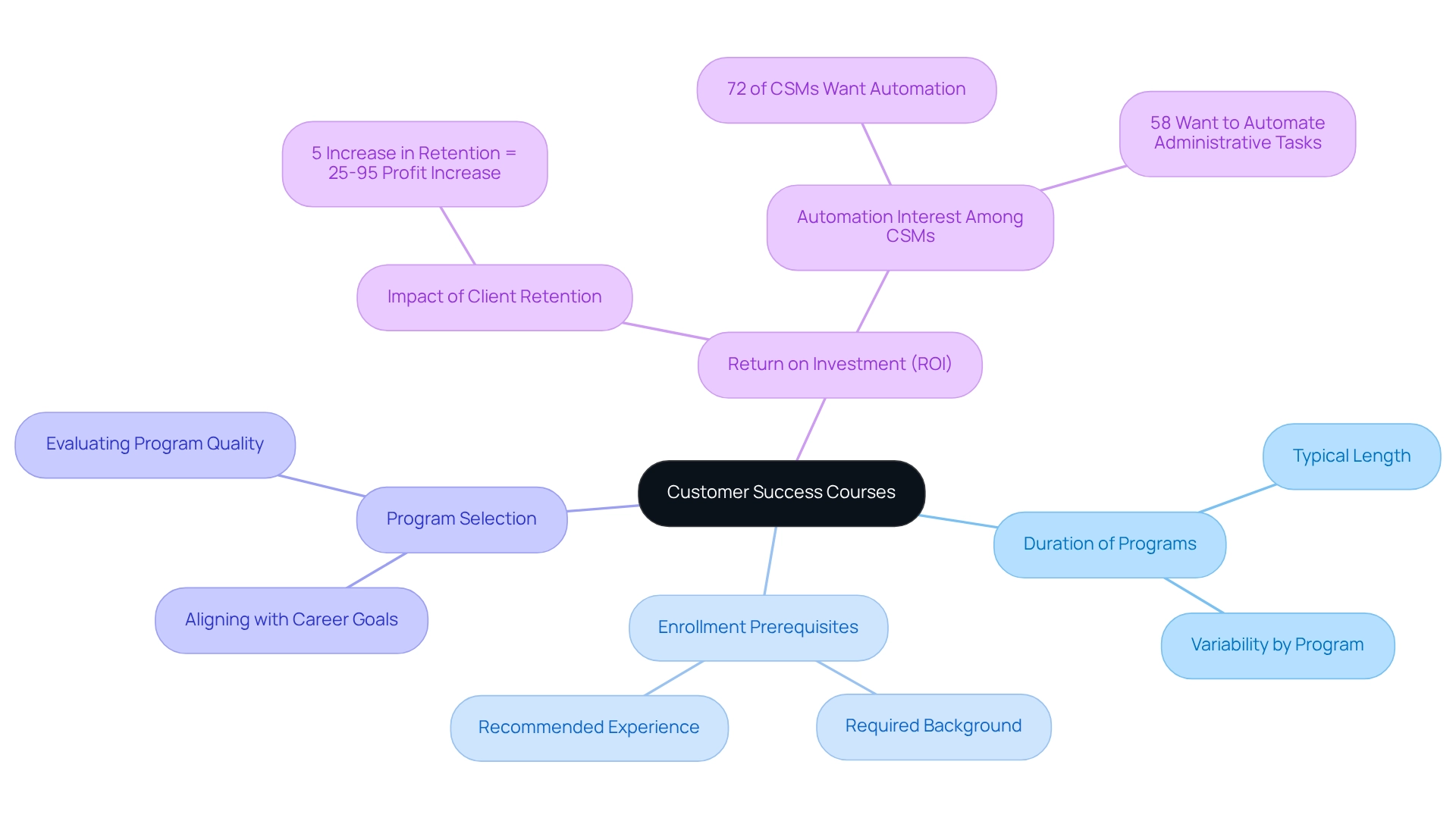
Investing in customer success training is not just beneficial; it is essential for organizations striving to excel in today's competitive landscape. These programs equip professionals with vital skills to forge robust customer relationships and achieve desired outcomes, leading to higher retention rates and increased revenue. As businesses increasingly recognize the significance of customer success, the demand for specialized training continues to escalate.
Customer success plays a pivotal role in enhancing loyalty and satisfaction, with effective engagement strategies significantly reducing churn. Companies that prioritize customer success training not only elevate customer experiences but also strategically position themselves for sustainable growth in a challenging market.
Furthermore, obtaining certifications in customer success offers a distinct competitive edge in the job market. These credentials bolster professional credibility and unlock advanced career opportunities, especially as organizations embrace more customer-centric strategies.
In summary, the growing importance of customer success training underscores its critical role in modern business practices. By investing in education and professional development in this domain, organizations can enhance their capabilities and secure a competitive advantage. Prioritizing customer success strategies is fundamental to ensuring that clients achieve their desired outcomes, fostering mutual growth and success in an evolving marketplace.
What are client achievement programs?
Client achievement programs are specialized training initiatives designed to equip professionals with the skills and knowledge necessary for helping clients achieve their desired outcomes while using a product or service. They cover various aspects of client management, including relationship development, onboarding processes, and proactive engagement strategies.
Why are client achievement programs important for businesses?
These programs are vital for fostering long-term relationships with clients, which helps drive business growth and reduce churn rates. By emphasizing client satisfaction and retention, businesses can enhance their overall performance and revenue.
How has the landscape of customer success courses changed in 2025?
The landscape has evolved significantly, with a notable increase in enrollment as organizations recognize the importance of investing in customer success training. Current data indicates that a substantial portion of employees would consider seeking alternative employment if required to return to the office full-time, highlighting the need for adaptable development solutions.
What role do data-driven technologies and AI play in client achievement training?
Businesses integrating data-driven technologies and AI into their client achievement strategies report enhanced interactions and improved service delivery. Client achievement teams are increasingly focused on data analytics and AI-driven conversations, leading to deeper insights and engagement with clients.
What are the core components of impactful client achievement programs?
Core components include comprehensive training on client relationship management, effective communication skills, and strategies for proactive client engagement, all of which are essential for successful client interactions.
How does education in customer success courses influence business outcomes?
Organizations that prioritize customer success training often see improved client satisfaction scores, higher retention rates, and increased revenue. Effective education directly impacts revenue generation and is considered essential for organizations aiming to excel in competitive markets.
What statistics highlight the importance of client satisfaction in business?
A study revealed that 78% of clients have abandoned a purchase due to a poor experience, emphasizing the need for effective engagement strategies. Additionally, firms prioritizing client satisfaction retain over twice the number of clients compared to those that do not.
What trends are expected to impact client experiences in 2025?
Despite advancements in technology, delivering exceptional client experiences will remain challenging due to rising expectations and privacy concerns. Companies are also recognizing that consumer satisfaction is linked to broader societal values, leading them to commit to sustainable practices.
What is the significance of onboarding processes in client achievement?
Robust onboarding processes can lead to a 55% increase in early product usage, which is crucial for long-term retention and enhances overall client experiences, contributing to sustainable business growth.